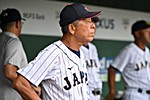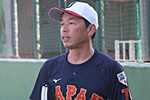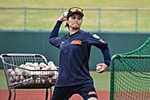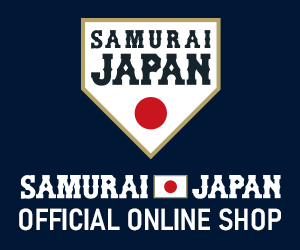Team Report
Chinese Taipei vs. Japan [November 7] Heading to Taipei - The Day before the Game
12/24/2013![]()
BASEBALL CHALLENGE 2013 - Review of the November 8 to 10 series from the day the teams arrived to the day it finished.
Heading to Taipei
Samurai Japan boarded two flights to Taipei on the morning of November 7th. Interest was high, as evidenced by the number of newspaper and TV reporters that came to see them off at Haneda Airport. With baggage in hand, Daichi Osera looked like he was used to traveling. "I was in Taiwan for a tournament last year," he said. Baseball has given me a great chance to travel." Just 22 years old, this young man already has a wealth of experience playing in international games, and he has developed into a very capable player.
After arriving at their hotel in Taipei, Samurai Japan attended a press conference from 3:00 PM with the Chinese Taipei team. At the beginning of the press conference, a VTR of WBC games played at Tokyo Dome in March was shown. The games were scheduled as friendly matches, but the players took them very seriously. "The games are not friendly matches," said Manager Kokubo on the first day. "They're all warm-ups, and we're looking to win them all."
Chinese Taipei player Yang Dai Kang located Samurai Japan members Sho Nakata and Coach Inaba to say hello. I interviewed Yan Dai Kang eight years ago when he was playing for Fukuoka Daiichi High School. Yang Dai Kang at that time was skinny kid that could not speak much Japanese. I never dreamed that I would see him playing professional ball; and to see him welcoming members of Team Japan to his country was heartwarming.

Practice at a Night Time before Games
As soon as the press conference finished, Samurai Japan boarded a bus for Xinzhuang Baseball Stadium, where the first and second games would be played, and practiced for about an hour and a half under the lights. Samurai players checked the ground, grass, the height of the lights, and wind direction.
The infield was grass, and the ground was red soil. The infielders said, "We've never played on this type of soil. It looks hard at first glance, but it hollows out easily."

Hideto Asamura said, "I rather wait to catch a grounder than rush to get it on such ground." Takayuki Kajitani (short) said, "I also want to wait, but I sometimes need to rush to catch it because of my position. It may be tough to call." Head Hiroshi Narahara did not seem too worried though.
"Even though we don't often see such soil in Japan, there's no need to be nervous about it. We also have plenty of experience playing on grass at Mazda Stadium, Hot Motto Field Kobe, and other places. Besides, I believe that our players can adjust themselves to any condition, even ones that they are not accustomed to. They'll be just fine."
"In international games there are always some things that are different from what we're used to in Japan. We need to adjust to it instead of worrying about it. That's it." Coach Narahara's attitude may be the key to playing well in international games.

A welcome dinner was held at the team's hotel. The young Samurais looked a bit tired because of the tight schedule they had that day. After dinner, they went back to their room to prepare for the next day's game.
Three games will start!
チャイニーズ・タイペイ戦 ドキュメント 【11月5日】新生侍ジャパンのはじまり
チャイニーズ・タイペイ戦 ドキュメント 【11月6日】ついに全世代がひとつになる
チャイニーズ・タイペイ戦 ドキュメント 【11月7日】試合前日、いざ台北へ
チャイニーズ・タイペイ戦 ドキュメント 【11月8日】強化試合がついに開幕
チャイニーズ・タイペイ戦 ドキュメント 【11月9日】逆転勝利で2連勝
チャイニーズ・タイペイ戦 ドキュメント 【11月10日】チームはひとつに!強化試合3連勝
チャイニーズ・タイペイ戦 ドキュメント 【11月11日】戦いを終えた侍ジャパン
Latest Article
 |
RAXUS SAMURAI JAPAN SERIES 2025 JAPAN vs KOREA roster announcement 10/8/2025 |
|---|
 |
2nd WBSC Youth Baseball5 World Cup 2025 roster announcement 9/7/2025 |
|---|
 |
WBSC U-18 Baseball World Cup 2025 presented by RAXUS roster announcement 8/23/2025 |
|---|
 |
31st BFA Asian Championship 2025 roster announcement 8/22/2025 |
|---|
 |
4th BFA Women's Baseball Asian Cup roster announcement 7/22/2025 |
|---|



![Chinese Taipei vs. Japan [November 7] Heading to Taipei - The Day before the Game](/img/news/special/2013taipei/2013taipei_1107_en.jpg)





















